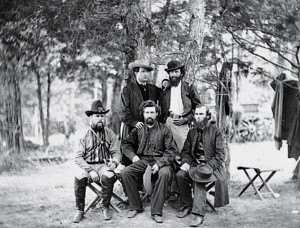
During the last years of my service in the United States Army, I had the honor of serving as a chaplain’s assistant in the 42nd Division Artillery. Since ordination I have had the privilege of serving as chaplain major of the National Lancers. Chaplains in the military serve a very necessary service.
I am an amateur Civil War buff and have started a small research project on the role of religion during this time period in history and more specifically the role of the chaplain during the war itself.
According to the book “Faith in the Fight” there were some 3,694 ministers, priests, and rabbis duly sworn and commissioned into service in the Armies of the North and the South. Officially noncombatants they were prohibited to act like soldiers and to be friends to all.
Rev. George S. Bradley of the 22nd Wisconsin Regiment wrote about the life of an Army chaplain in his book, The Star Corps: Notes of an Army Chaplain during Sherman’s Famous March to the Sea, published in 1865. He wrote that “The regulations require that a chaplain must be an ordained minister of the Gospel. That means he must have spent several quiet years as a student and probably several more with a peaceful congregation.”
The Reverend John E. Robie of the 74th New York State Militia wrote an article for the Buffalo Christian Advocate, which he owned, about the qualifications and duties of the Army Chaplain:
“In order to become a chaplain it is necessary to get a certificate of not less than five ministers of one’s own denomination that one is a regularly-ordained clergyman… He must be elected to the position by the regiment which he will serve… He will be paid $100 a month and $18 for rations with forage for one horse… As the commanding officer will permit, the chaplain should have prayer daily at dress parade… The prayer should not be more than three minutes long… On Sunday, but one service can be held, and that not always… The service, including scripture-reading, singing, sermon or address, and prayers should occupy 20 or 25 minutes – never over 30.”
Very interesting accounts of what the life of a chaplain really was during the time of war. The role of the chaplain has not changed all that much since those days and is still a vital part of the military service.
One chaplain that I will mention is Father William Corby who served with the 88th New York Infantry Brigade of the famous Irish Brigade. Fr. Corby is the chaplain on the lower right in the picture at the top of the page. Chaplain Corby came to fame due to his role at the Battle of Gettysburg.
On the afternoon of July 2, 1863 the Irish Brigade was located on Cemetery Ridge and was preparing to go into battle at the Wheatfield. Fr. Corby asked for permission to speak to the men and stepping upon a boulder he called upon God to grant the men courage and then pronounced a conditional general absolution on the men gathered before him. He warned the soldiers that the forgiveness of their sins was only good to men who did their military duty.
A statue has been erected to honor Fr. Corby and at the time of its construction it was the first statue depicting a non-general on the battlefield.
Fr. Corby went on after the war to become the president of Notre Dame University.
There are many more stories like these in the pages of history and I hope to bring some of them to these pages as time goes on. We should be thankful that even today, men and women are answering the call the serve the military as chaplains.

That is SO cool! I’m a history/civil war buff, myself. Oh, and before I forget, thank you for YOUR service, as well. 🙂
My Great Great Great grandfather fought for the 34th GA Infantry. He signed up underage (he was sixteen). He lost a finger or two at the Battle of Missionary Ridge (I found actual copies of his Confederate Pension/Disability application on ancestry dot com…so cool!) and, in the last weeks of the war, was captured and spent the remainder of the war (like, all three weeks of it) at a POW camp in Meridian, MS (where, ironically, I have some very dear military friends, and I’ve even visited there before i knew all this…small world). He came home after the war, became a methodist minister, married, and lived happily ever after. 🙂